The AMD Ryzen Threadripper 3960X and 3970X Review: 24 and 32 Cores on 7nm
by Dr. Ian Cutress, Andrei Frumusanu & Gavin Bonshor on November 25, 2019 9:05 AM ESTCPU Performance: Web and Legacy Tests
While more the focus of low-end and small form factor systems, web-based benchmarks are notoriously difficult to standardize. Modern web browsers are frequently updated, with no recourse to disable those updates, and as such there is difficulty in keeping a common platform. The fast paced nature of browser development means that version numbers (and performance) can change from week to week. Despite this, web tests are often a good measure of user experience: a lot of what most office work is today revolves around web applications, particularly email and office apps, but also interfaces and development environments. Our web tests include some of the industry standard tests, as well as a few popular but older tests.
We have also included our legacy benchmarks in this section, representing a stack of older code for popular benchmarks.
All of our benchmark results can also be found in our benchmark engine, Bench.
Speedometer 2: JavaScript Frameworks
Our newest web test is Speedometer 2, which is a accrued test over a series of javascript frameworks to do three simple things: built a list, enable each item in the list, and remove the list. All the frameworks implement the same visual cues, but obviously apply them from different coding angles.
Our test goes through the list of frameworks, and produces a final score indicative of ‘rpm’, one of the benchmarks internal metrics. We report this final score.
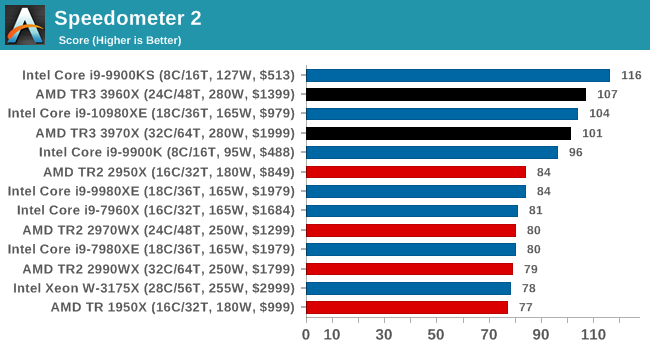
Google Octane 2.0: Core Web Compute
A popular web test for several years, but now no longer being updated, is Octane, developed by Google. Version 2.0 of the test performs the best part of two-dozen compute related tasks, such as regular expressions, cryptography, ray tracing, emulation, and Navier-Stokes physics calculations.
The test gives each sub-test a score and produces a geometric mean of the set as a final result. We run the full benchmark four times, and average the final results.
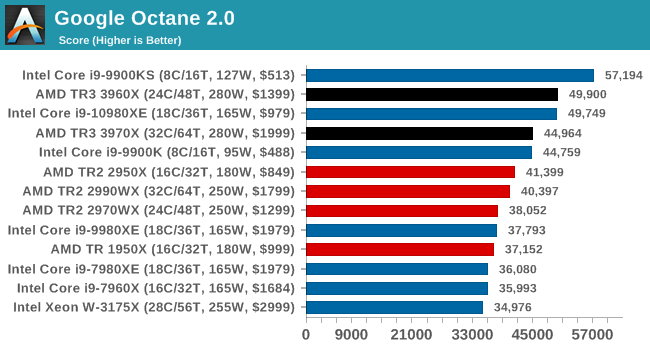
Mozilla Kraken 1.1: Core Web Compute
Even older than Octane is Kraken, this time developed by Mozilla. This is an older test that does similar computational mechanics, such as audio processing or image filtering. Kraken seems to produce a highly variable result depending on the browser version, as it is a test that is keenly optimized for.
The main benchmark runs through each of the sub-tests ten times and produces an average time to completion for each loop, given in milliseconds. We run the full benchmark four times and take an average of the time taken.
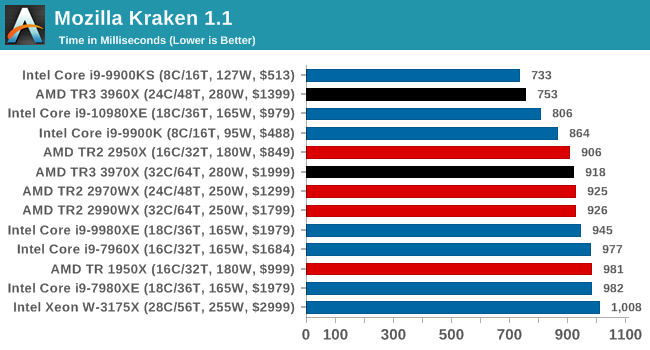
3DPM v1: Naïve Code Variant of 3DPM v2.1
The first legacy test in the suite is the first version of our 3DPM benchmark. This is the ultimate naïve version of the code, as if it was written by scientist with no knowledge of how computer hardware, compilers, or optimization works (which in fact, it was at the start). This represents a large body of scientific simulation out in the wild, where getting the answer is more important than it being fast (getting a result in 4 days is acceptable if it’s correct, rather than sending someone away for a year to learn to code and getting the result in 5 minutes).
In this version, the only real optimization was in the compiler flags (-O2, -fp:fast), compiling it in release mode, and enabling OpenMP in the main compute loops. The loops were not configured for function size, and one of the key slowdowns is false sharing in the cache. It also has long dependency chains based on the random number generation, which leads to relatively poor performance on specific compute microarchitectures.
3DPM v1 can be downloaded with our 3DPM v2 code here: 3DPMv2.1.rar (13.0 MB)
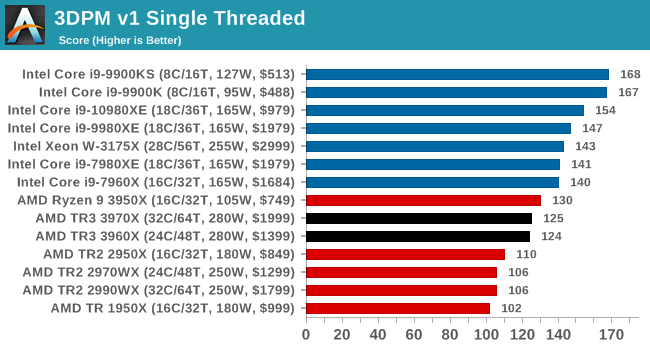
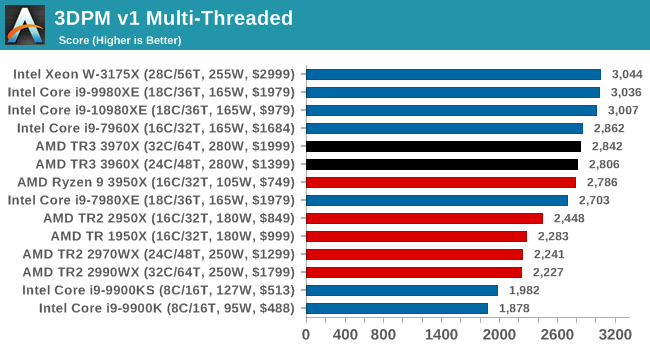
x264 HD 3.0: Older Transcode Test
This transcoding test is super old, and was used by Anand back in the day of Pentium 4 and Athlon II processors. Here a standardized 720p video is transcoded with a two-pass conversion, with the benchmark showing the frames-per-second of each pass. This benchmark is single-threaded, and between some micro-architectures we seem to actually hit an instructions-per-clock wall.
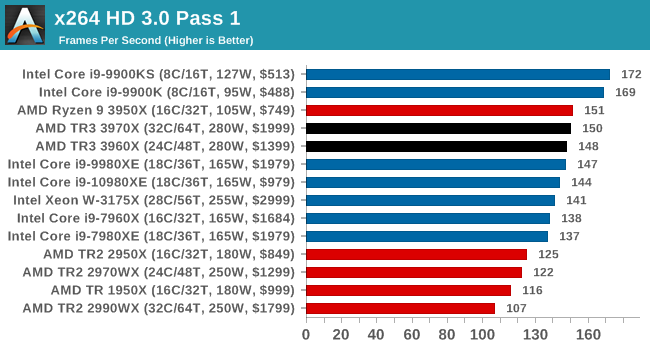
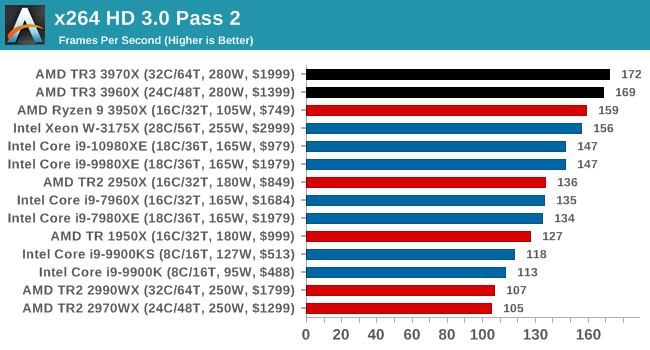
GeekBench4: Synthetics
A common tool for cross-platform testing between mobile, PC, and Mac, GeekBench 4 is an ultimate exercise in synthetic testing across a range of algorithms looking for peak throughput. Tests include encryption, compression, fast Fourier transform, memory operations, n-body physics, matrix operations, histogram manipulation, and HTML parsing.
I’m including this test due to popular demand, although the results do come across as overly synthetic, and a lot of users often put a lot of weight behind the test due to the fact that it is compiled across different platforms (although with different compilers).
We record the main subtest scores (Crypto, Integer, Floating Point, Memory) in our benchmark database, but for the review we post the overall single and multi-threaded results.
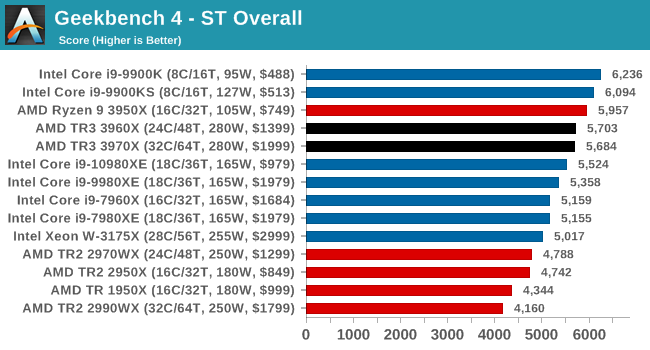
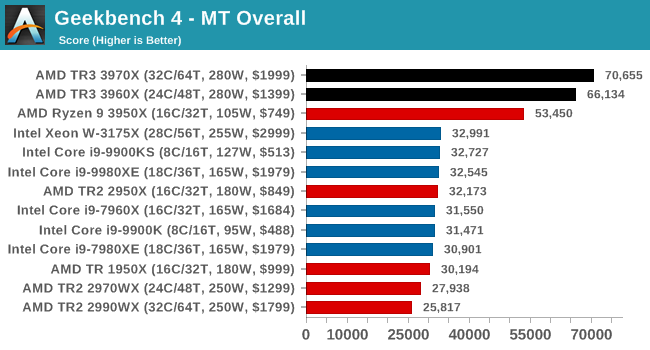










245 Comments
View All Comments
Xyler94 - Tuesday, November 26, 2019 - link
Gotta love the "But what about this" with you fanboys.Did AMD beat Intel to the X86-64 Race? Yes
Did AMD beat Intel to the 1Ghz Race? Yes
Did AMD beat Intel to the true dual-core arc? Yes
Does AMD still continue to innovate and bring us better products, despite their peanut funding compared to Intel, while Intel just tries to weasel their way through the market? Of course. Do you honestly believe if TR3 wasn't so amazing, that Intel would have reduced their 18 core part to 1k out of the goodness of their heart? If you think that, you're more of a fanboy than I thought.
It is still known as AMD-64 today, because AMD found the way to do both 32bit and 64bit X86 at the same time, and Intel has to license that tech from AMD. Without AMD, Intel would not be releasing 8 core CPUs today. The reason for their shortages isn't really due to high demand, it's due to varying demand of their products. the 6-8 core silicon is different from their 4 core ones, and they needed to manufacture separate LCC and HCC core i9/Xeons, further hogging their supply chain. And there's also the fact the 9900k is also a legitimately great CPU, so people want it, further hurting the supply chain. Intel did this to themselves due to years of complacency, so I don't feel bad at all.
blppt - Wednesday, November 27, 2019 - link
"Did AMD beat Intel to the X86-64 Race? Yes"They didn't beat Intel to anything---Intel was going with IA64, never going with x64, Then AMD threw a MASSIVE wrench into those plans, lol. Intel was forced to then copy AMD64 with EMT64 when Itanium flopped.
But make no mistake---if AMD didn't create x86-64, Intel wouldn't have either. We'd all be running Itaniums and Itanium clones.
Qasar - Wednesday, November 27, 2019 - link
actually, for the most part, the industry didnt want ia 64, it would me a redo of most, if not all of the software just to use it, before they could even use it, with AMD64, you could keep using existing 32 bit software, and transition of 64 bit, when you can, or wanted to. amd just found a better, and quicker way to 64 bit then when intel was trying to cram down every ones throats."
But make no mistake---if AMD didn't create x86-64, Intel wouldn't have either." and chances are, we could be still using 32 bit cpus, as i said above, most, if not all of the industry didnt want to have to re compile all of the software we used then. and wasnt itanium slower then x86 over all ?
ahh yep.. it was slower : " By the time Itanium was released in June 2001, its performance was not superior to competing RISC and CISC processors. " from https://en.wikipedia.org/wiki/IA-64
Qasar - Wednesday, November 27, 2019 - link
would me a redo of most = would mean a redo of mostblppt - Monday, December 2, 2019 - link
One of the big reasons Itanium/IA-64 failed was that its "backwards compatibility" (i.e. x86 emulation) was much slower than the native x86 cpus out at the time.So, while they wouldn't need to redo all that x86 software, it wasn't exactly speedy while emulating.
To take full advantage of the IA64 architecture, yes, they would need to rewrite a lot of software, but it would have *run* without a rewrite.
And that's where x86-64 stepped in. 64 bit memory addressing, perfect x86-32 performance at a lower price.
But Intel was never going to create x64 by themselves unless the new EPIC/VLIW IA64 hit some kind of performance brick wall, or people just kept coding to x86 anyways (which Itanium would run, but slowly).
Bear in mind that part of the reason it was slow in 2001, x86 and Power had been extensively optimized compilers for a decade (or more for x86) and IA64 was in its nascent stages. Since it was never adopted by the mass public (include home users, etc), development of IA64 never came close to the level of development and optimization of x86.
Qasar - Tuesday, December 3, 2019 - link
either way you look at it, it seems AMD is doing more to move the cpu farther, then intel does. AMD seems to be the one that innovates, while intel sleeps. i know some who is a fan of intel, will refute this, but think about it... AMD improves the cpu, and moves it forward, while intel stagnates and stifles it..eva02langley - Monday, November 25, 2019 - link
Desktop and HEDT is not Intel business anymore. Just a matter of time for server and laptop to eat the same bullet.eek2121 - Monday, November 25, 2019 - link
I wouldn't say that AMD fans are wrong. Look at AMD's revenue years ago vs today. Do you think the growth came out of thin air? No, AMD is eroding Intel's marketshare. It hasn't begun to show yet, because the last reported earnings did not include Zen 2 eating into things. More and more people are buying AMD, and as long as AMD continues to execute as they have (and even more so: they have to get into bed with OEMs), Intel will gradually begin to suffer. They already HAVE suffered. Drastic price reductions on their highest end parts.eek2121 - Monday, November 25, 2019 - link
Oh and I should add that Intel is in a lot more markets than AMD. In addition, Intel actually does a ton of fab work for other companies. Intel makes networking cards, storage, and much more. So in translation: Revenue is meaningless. Intel does not have endless amounts of cash to throw at creating new CPUs, GPUs (which are coming out in 2021), and chipsets. What matters is marketshare. For Intel, it's shrinking.tygrus - Tuesday, November 26, 2019 - link
AMD have taken market share from Intel but it's not uniform across all markets. Fancy brand names, servers and ultra notebooks are still dominated by Intel and where the end-user isn't making a choice. Enthusiasts using a local store to select parts & assemble are a small market that have swung to AMD.